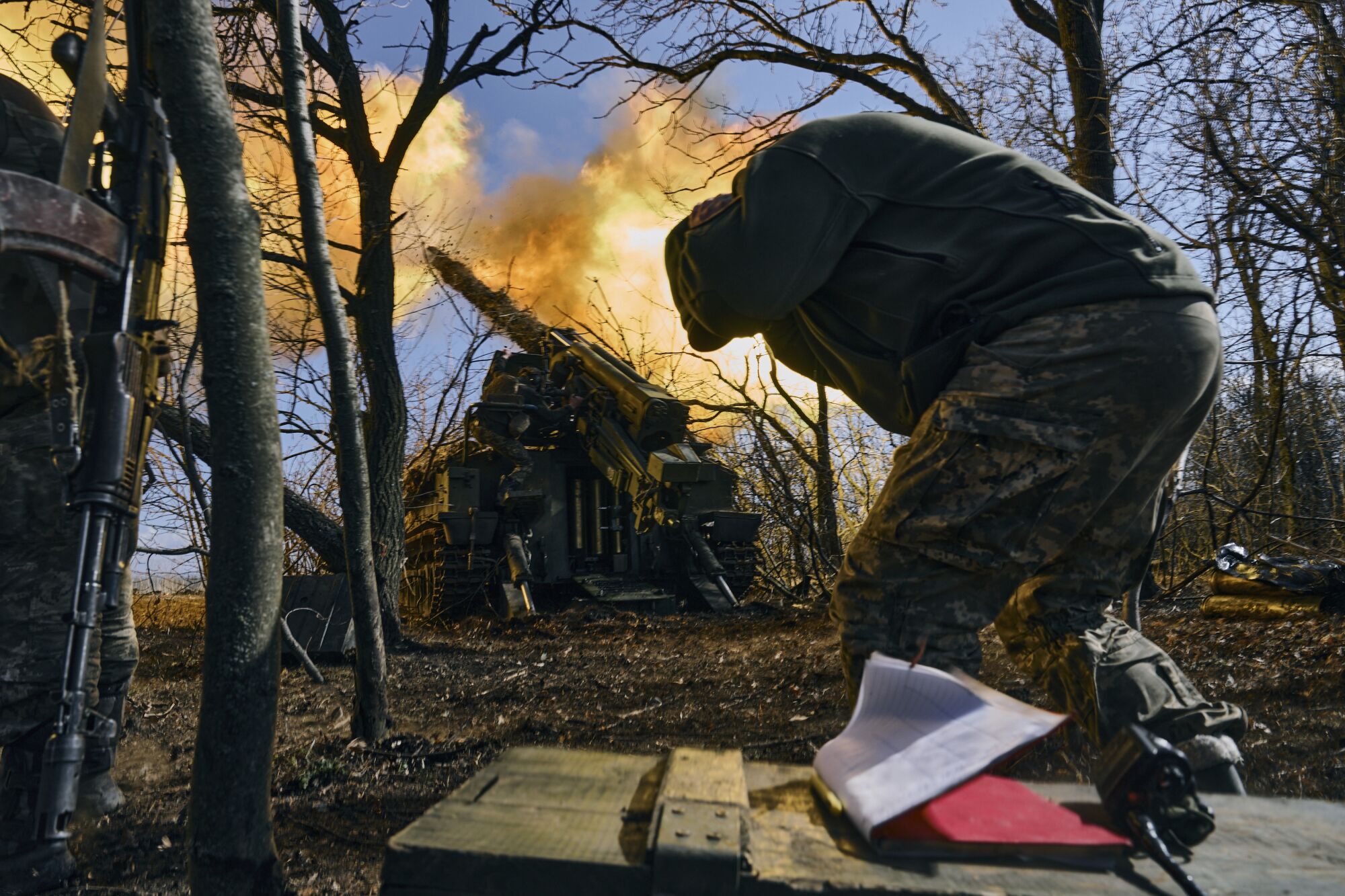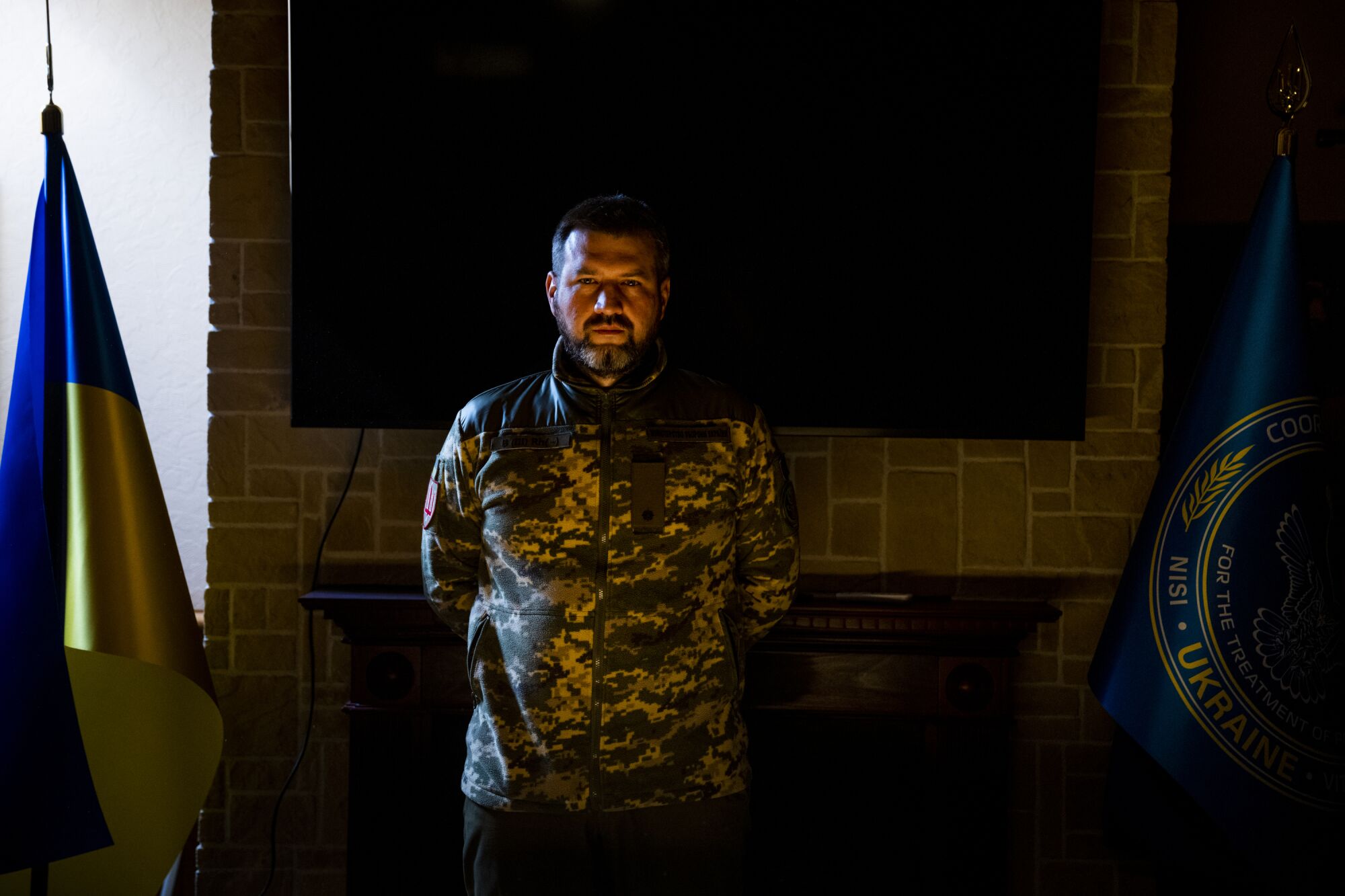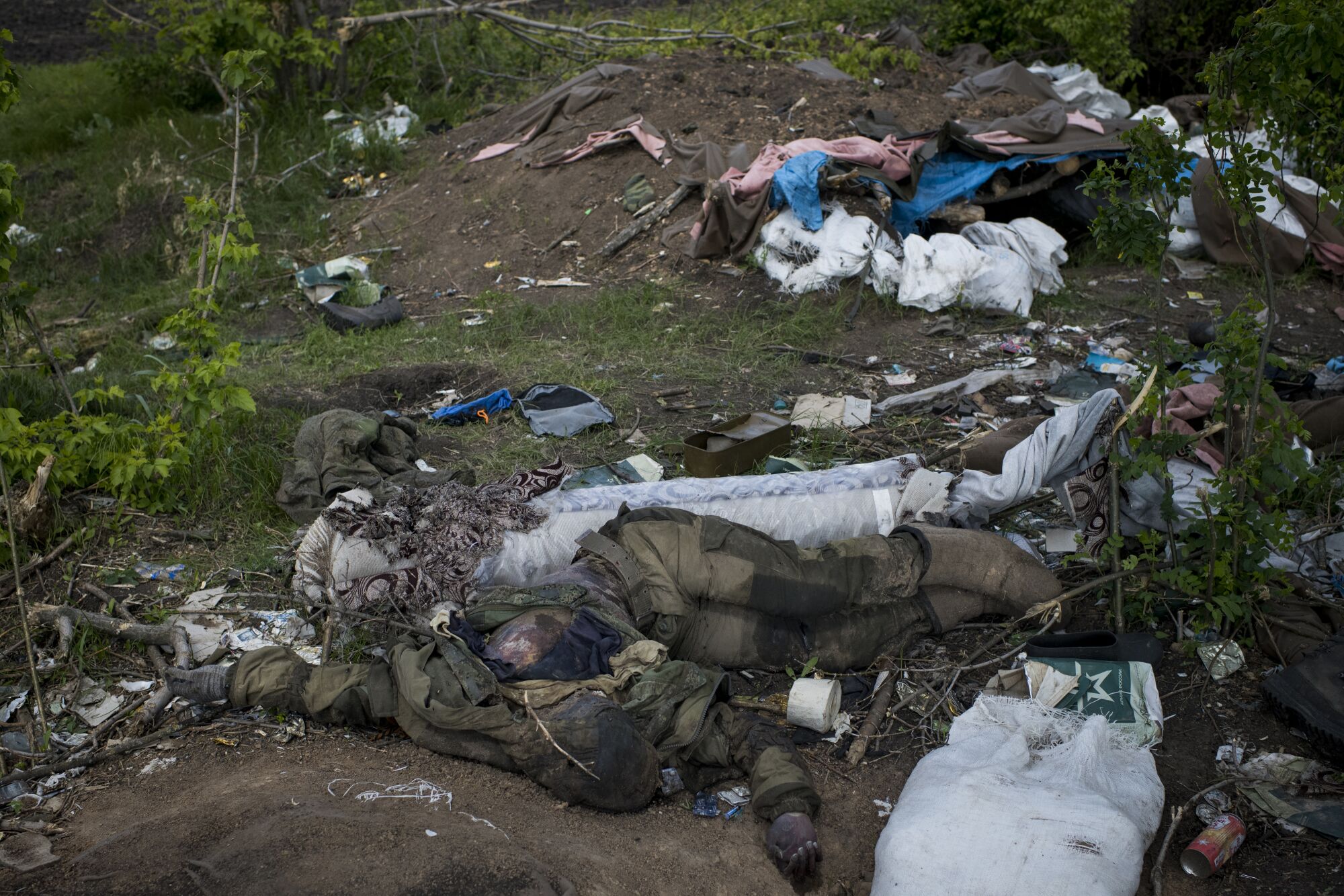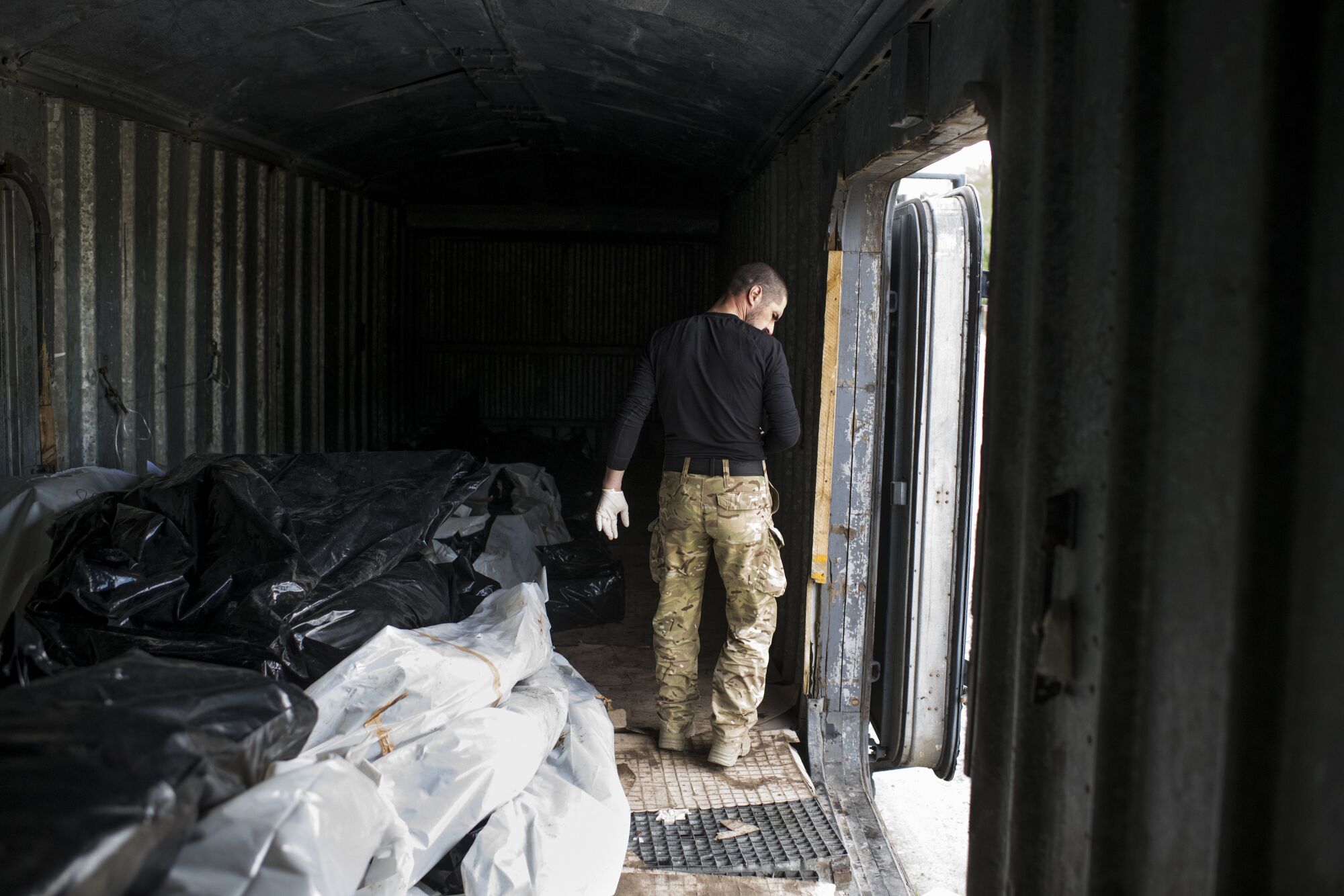How Ukraine’s give up hotline for Russian troopers works
[ad_1]
Certain for the battlefield, sounding harried and anxious, the Russian soldier positioned a hasty telephone name — to a Ukrainian navy hotline.
“They are saying you’ll be able to assist me give up voluntarily, is that proper?” requested the serviceman, explaining that he was quickly to be deployed close to the southern Ukrainian metropolis of Kherson.
“When Ukrainian troopers come, do I simply kneel down, or what? Do you promise to not movie me whereas that is occurring?”
In fluent Russian, the hotline operator calmly assured him he’d be given detailed directions on the way to safely lay down his weapon and switch himself in.
“Once you get to the entrance strains, simply name us instantly,” she mentioned.
At a vital juncture in a very bloody warfare, Ukraine’s navy is concentrated on one job: eradicating Russian troopers from the battlefield. However confronted with a foe whose ranks are identified to be riddled with unwilling fighters, Ukrainian navy strategists realized there is perhaps multiple means to that finish.
With that, the “I Wish to Reside” outreach was born, geared toward offering invading forces with step-by-step data on the way to abandon the ranks. Initially run by Ukrainian police, this system has had a ramped-up, military-operated model in place since mid-September.

Ukrainian troopers on Sunday hearth a self-propelled howitzer towards Russian positions close to Bakhmut within the Donetsk area.
(Libkos / Related Press)
On Russian-language social media, Ukrainians have unfold the phrase about this system’s web site, meant as a portal for the surrender-curious or their family members. It has attracted greater than 13.3 million visits — 7.6 million of these from Russian territory, organizers mentioned.
Russian troopers additionally present private information via a chatbot on the encrypted messaging app Telegram — data Ukrainian authorities use to winnow down those that are severe about turning themselves in. The chatbot, along with the hotline, has drawn practically 10,000 contacts, in line with organizers.
Citing safety causes, Ukrainian officers declined to reveal what number of surrenders have been brokered through this system. However hotline operators subject calls across the clock from Russians who’re quickly to be mobilized, are within the midst of being deployed or are already on the battlefield. Callers is perhaps jittery or stoic, defensive or remorseful, coolly businesslike or floridly emotional — typically all of these in a single dialog.
“So, this isn’t pretend?” one Russian soldier requested.
“It’s not pretend,” the Ukrainian operator replied.
The ten-member hotline crew, all active-duty service personnel with backgrounds in psychology, is tasked with offering callers with clear, concise directions, whereas being alert to indicators that the outreach is perhaps a “probe” by Russian intelligence, meant to elicit details about Ukrainian strategies and intentions.

Vitaly Matvienko, spokesperson on the Ukrainian division for prisoners of warfare, which manages the “I Wish to Reside” hotline for Russians who want to give up.
(Pete Kiehart / For the Occasions)
Nonetheless tense the backdrop, these dealing instantly with would-be surrenderers attempt to “calm them down,” mentioned Vitaly Matvienko, a junior lieutenant who serves as spokesman for this system, which is run by the division for prisoners of warfare.
“Hello, I’m listening,” goes a sometimes low-key operator salutation in an audio sampling of current calls offered by the Ukrainian navy. Within the recordings made public, callers’ voices are distorted to defend their identities.
Hotline operators initially labored out of navy headquarters within the Ukrainian capital, Kyiv, however have been later moved to a secret location as a result of they’re now seen as a high-profile potential goal, Matvienko mentioned. The navy refused to make any operators accessible for interviews however mentioned they’re female and male, a variety of ages and all in a position to chat simply in colloquial Russian.
Relating to surrenders within the subject, either side are conscious that the second carries huge threat for all concerned, he mentioned.
“Typically, it’s a really harmful course of,” mentioned Matvienko. However strict protocols, clearly specified by advance, enhance the percentages of everybody staying alive.
Russians who need to show themselves in are instructed to wave a white fabric, take away the magazines from their weapons, level the barrels to the bottom and eschew physique armor and helmets. They’re assured that within the occasion they wish to be despatched house in a prisoner swap, their paperwork will mirror that they have been captured, not that they gave up voluntarily.
If it’s a bring-your-own-tank give up, which occurs not occasionally, the turret is to be turned in the wrong way. If it’s a gaggle give up — additionally a reasonably frequent incidence, with a Russian squad typically fearing retribution from commanders however agreeing to behave collectively and surreptitiously — the highest-ranking soldier should establish himself.

The physique of a Russian soldier lies amid deserted positions in Mala Rohan, Ukraine, in Might.
(Pete Kiehart / For The Occasions)
If a surrendering soldier runs out of choices for separating himself from his unit, the hotline affords assist.
“We will coordinate with particular items that can extract you secure and sound,” one operator instructed a anxious caller.
Like a lot on this battle, the “I Wish to Reside” program employs each high-tech strategies and easy communication instruments.
Russians dealing with deployment can talk with the Ukrainian facet utilizing the Telegram chatbot, and earlier than leaving for the entrance, they’re urged to acquire and conceal a primary flip telephone — not a smartphone — and use that to name the hotline.
Ukrainians say they’ve heard from Russian troopers already on the battlefield who discovered of the hotline by word-of-mouth or from a scrawled-on slip of paper handed from hand handy.
In Russia’s battle to subdue Ukraine, now in its second 12 months, considered one of Moscow’s biggest benefits is the sheer variety of troops it will probably throw into the battle, Western navy analysts say — which is why Ukraine is prepared to attempt novel techniques to scale back these numbers.
Along with the 190,000 Russian troopers who took half within the preliminary multipronged invasion that started in February 2022, Russian President Vladimir Putin final 12 months ordered the mobilization of 300,000 extra, lots of whom are actually in Ukraine. And one other main mobilization is anticipated as Russia seeks to mount a spring offensive.
However regardless of a greater than 2-to-1 Russian benefit in its standing navy, Moscow’s faltering efficiency has been blamed on troop high quality, which has deteriorated because the warfare goes on. Western navy observers persistently cite poor morale, substandard coaching and shambolic provide practices as key elements in a string of Russian battlefield routs final autumn.
“With a view to snatch a victory of kinds from the jaws of defeat, Putin should now depend on the overwhelming numbers offered by mass mobilization,” analyst Peter Dickinson wrote in a report final month for the Atlantic Council. “This can be a tried and examined Russian tactic, nevertheless it additionally carries appreciable dangers.”
Deploying 1000’s of untrained troopers “to battle in opposition to battle-hardened and extremely motivated Ukrainian troops may end result within the form of carnage that breaks armies,” he wrote.
At first of the invasion, some Russian troops apparently believed they’d be welcomed by Ukrainians as liberators. However fierce navy resistance, coupled with widespread reveals of disdain and defiance from civilians, quickly disabused them of that notion.
Final autumn’s mobilization by Putin prompted an enormous exodus of fighting-age males from Russia, with a whole lot of 1000’s settling in Turkey, Georgia, Kazakhstan and different close by nations to keep away from being conscripted.
Western analysts say it has change into extra extensively identified inside Russia that Moscow’s commanders have scant regard for the lives and welfare of their very own troops.
January and February noticed an uptick in Russian-language social media postings about harrowing subject situations and chaotic management — accounts extensively echoed in months of intercepted calls house from deployed Russian troops.

A person who requested to be recognized by his name signal, Summer season, checks our bodies in a refrigerated prepare used to retailer the stays of Russian troopers in Kharkiv, Ukraine, in Might.
(Pete Kiehart / For The Occasions)
In mid-February, a British navy intelligence evaluation mentioned Russian forces have been struggling what gave the impression to be the best casualty charges because the early weeks of the warfare — many occurring close to the hotly contested city of Bakhmut. Whereas Ukraine has suffered heavy attrition as nicely, Russia misplaced exceptionally massive numbers of troops and armored autos in a failed try final month to storm the Ukrainian-held jap city of Vuhledar — an apparently bungled opening volley in a much-vaunted Russian spring offensive.
Ukrainian officers hope that such setbacks will serve a twin function: inflicting a expensive defeat, and prompting Russian troopers to acknowledge the typically suicidal function they’re anticipated to play in human-wave assaults on fortified Ukrainian positions, which have been a recurring function of current combating.
“With their very own eyes, they see they’re nothing greater than cannon fodder,” Matvienko mentioned. “They see considered one of their comrades being ordered to stroll right into a minefield to discover a path, and he will get blown up, and one other is instructed to go subsequent, and he’s blown up too, and on it goes.”
Episodes like this, he mentioned, can provoke a determined sense of self-preservation.
“They understand that is actual and never some warfare film,” he mentioned. “And the thought has to happen to them: ‘How do I save myself?’”
One caller, sounding indignant and despairing, used an expletive to explain the prospect of sudden demise in battle.
“A single mortar shell, and it’s accomplished,” he mentioned. “Who wants this warfare?”

